Yes, you are losing customers right now. Not because your product sucks or your service isn’t good enough. You’re losing them because when they search “plumber near me” or “best Italian restaurant in downtown,” your competitors show up and you don’t.
Here’s what kills me: 46% of all Google searches are local. That’s nearly half of the 8.5 billion daily searches. And 76% of people who search for something nearby visit a business within 24 hours.

Meanwhile, 58% of businesses still haven’t invested in local SEO. That’s not competition. That’s free money sitting on the table.
The worst part?
Most local business owners think local SEO is complicated.
They assume it requires a marketing degree or a massive budget.
Wrong.
What you need are the right tools and a no-BS approach to using them. That’s exactly what this guide delivers.
TL;DR: Best Local SEO Tools
If you’re skimming this between customer calls, here’s what matters.
The best local SEO tools help you dominate three critical areas: your Google Business Profile (where 88% of consumers find local businesses), online reviews (which 76% of customers check before visiting), and local rankings across Google Maps.
Free tools like Google Business Profile and GMB Everywhere handle the basics.
Paid tools like BrightLocal, Semrush Local, and Local Falcon give you the competitive edge through automated citation building, review management, and precise rank tracking.
Budget under $50/month?
Start with Google Business Profile plus one specialized tool like Whitespark or Local Falcon.
Budget over $100/month?
Go all-in with Semrush or BrightLocal for complete local SEO automation.
The ROI is straightforward: businesses ranking in Google’s top three local results get 126% more traffic and 93% more customer actions than those ranked 4-10.
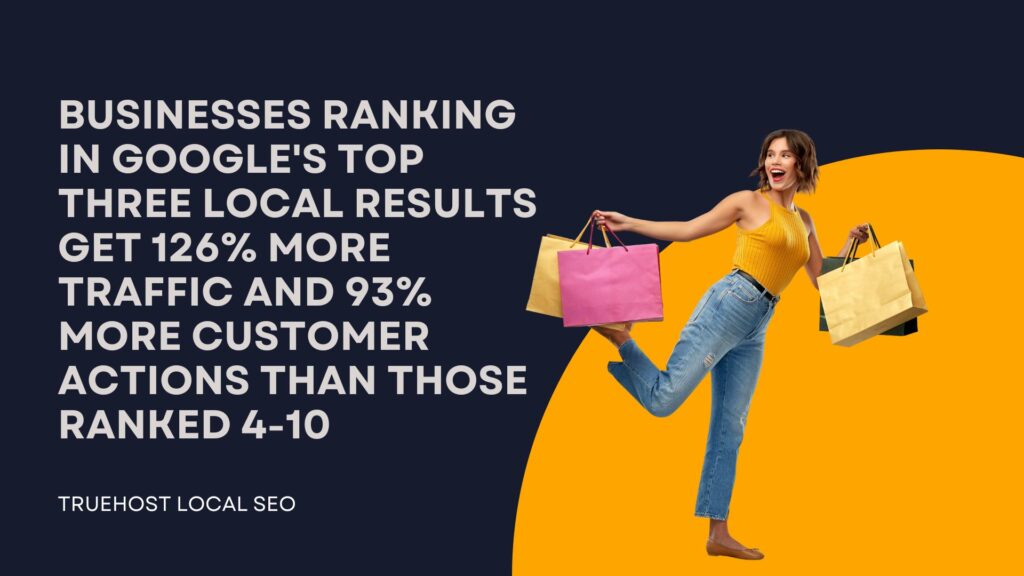
More visibility equals more calls, more visits, more sales.
Read also: How to Use a Local SEO Audit Tool to Improve Rankings.
Why These Tools Will Transform Your Local Presence
Let me be direct. You’re not here for theory. You’re here because your phone isn’t ringing enough.
Your competitors are stealing customers who should be walking through your door.
Every day you delay implementing proper local SEO is another day your competition wins.
The businesses dominating local search aren’t smarter than you.
They’re not working harder. They simply use tools that automate the tedious work, track what actually moves the needle, and give them data to make smart decisions.
That’s the difference between guessing and knowing.
Think about it this way.
Your competitor ranks #1 on Google Maps for “emergency plumber” while you’re buried on page two.
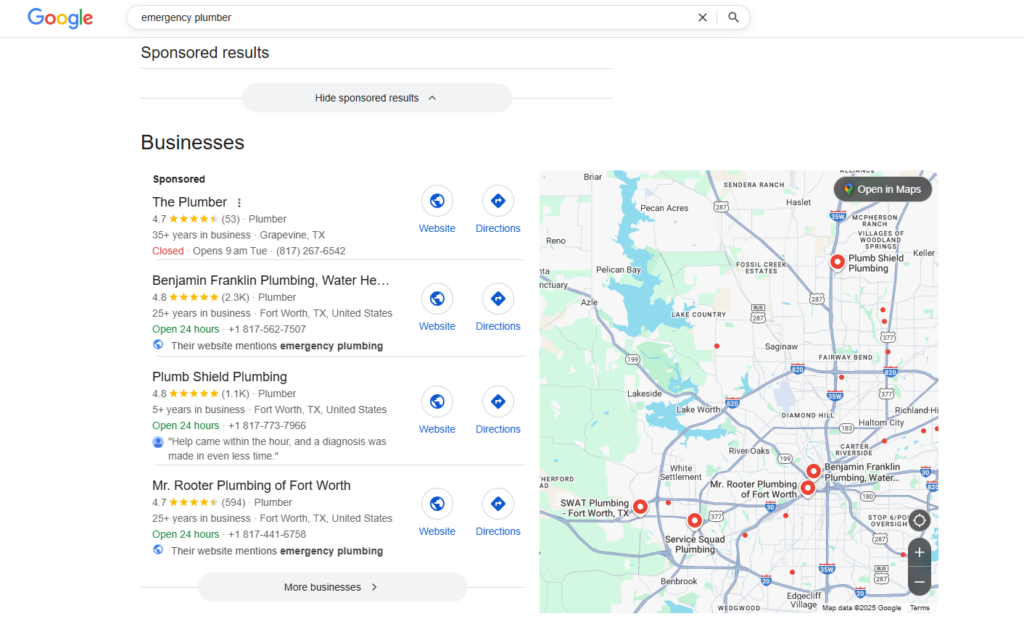
When someone’s basement floods at 2am, who gets the $800 service call? Not you.
Multiply that scenario across every service area, every keyword, every hour of every day. That’s real revenue walking away.
The right local SEO tools change this equation completely.
They help you optimize your Google Business Profile so you show up in that coveted top three.
They monitor your rankings across your entire service area so you know exactly where you’re visible and where you’re invisible. They automate review requests so you’re building social proof while you sleep.
And if you’d rather have experts handle this entire process, our professional local SEO services deliver measurable results without the learning curve.
Here’s what we’re covering: the eight tools that actually matter, what they cost, what they do, and which one fits your specific situation.
And no, we are not affiliates of any of these local SEO tools.
1. Google Business Profile (Free)
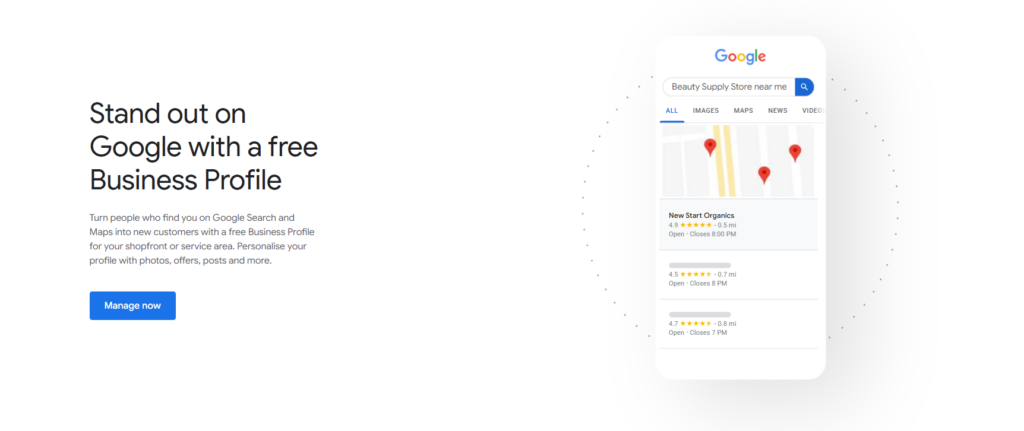
If you only use one local SEO tool, use this.
Google Business Profile is non-negotiable because it directly controls how you appear in local search results and Google Maps. It’s free, it’s powerful, and most businesses are using maybe 30% of its capabilities.
What it does: GBP lets you manage your business listing across Google Search and Maps. You can update your hours, phone number, address, services, and photos. You can respond to reviews, post updates, and track how customers find you. Sounds basic, but here’s the reality: businesses with complete, verified profiles are 50% more likely to be considered for purchases.
Why it matters: Google processes this data to determine if you show up in local searches. Incomplete profile? You’re invisible. Outdated hours? Customers get frustrated and leave negative reviews. No photos? Customers trust you 2.7 times less than competitors with visual content.
A local HVAC contractor I know spent one Saturday afternoon optimizing his GBP.
He added 20 service photos, updated his service list, posted weekly tips, and started responding to every review within 24 hours. Within 90 days, his calls increased 40%. Same business, same services, better visibility.
Best for: Every single local business. Zero exceptions. If you have a physical location or serve customers in specific areas, you need this.
Time investment: Initial setup takes 2-3 hours. Weekly maintenance takes 20-30 minutes.
Get started: Claim your profile at google.com/business. Verify your location. Fill out every single field. Upload at least 10 high-quality photos. Set up posts and start responding to reviews.
2. BrightLocal: The Complete Local SEO Platform (Paid)
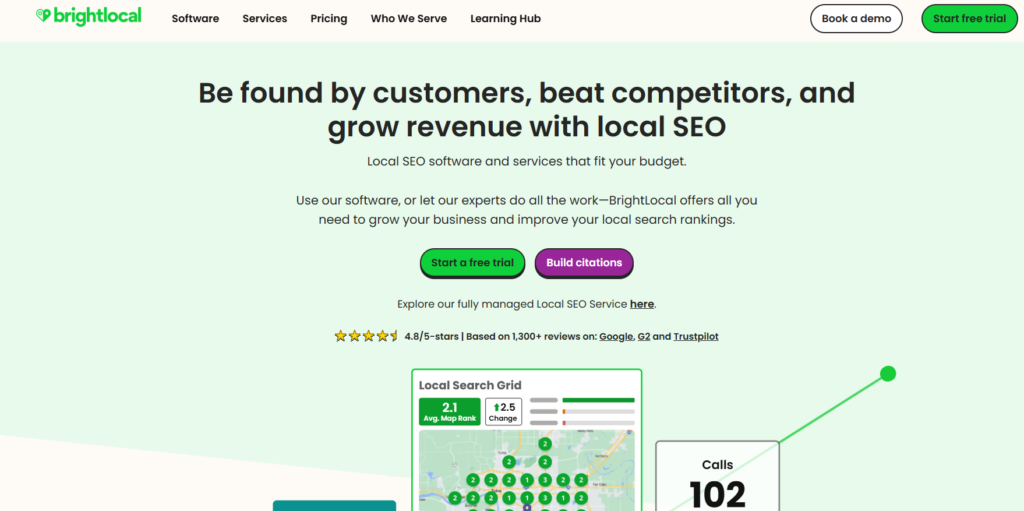
BrightLocal is the Swiss Army knife of local SEO software. It handles everything from citation building to rank tracking to review monitoring.
If you’re serious about local SEO but don’t want to juggle five different tools, this is your solution.
What it does: BrightLocal offers local citation tracking (ensuring your business name, address, and phone number are consistent across 100+ directories), local rank tracking (showing where you appear for specific keywords in different locations), review monitoring (aggregating reviews from Google, Yelp, Facebook in one dashboard), and competitor analysis (tracking what your competitors are doing and where they’re ranking).
See, most local businesses have inconsistent citations scattered across the web. Different phone numbers on different sites. Old addresses nobody updated. BrightLocal finds these inconsistencies and fixes them. That consistency signals trust to Google, which improves your rankings.
A restaurant chain with five locations was managing citations manually.
They had 47 incorrect listings across various directories, some showing closed locations, others with disconnected phone numbers.
After implementing BrightLocal’s citation service, they cleaned up every listing in 60 days.
Result: 35% increase in organic calls and a jump from #7 to #3 average ranking in their local markets.
Pricing: Plans start at $39/month for a single location. Agency plans scale based on locations and features. The ROI calculation is simple: if one additional customer per month covers the cost, you’re profitable.
Best for: Multi-location businesses, agencies managing client local SEO, and serious business owners who want comprehensive data without the complexity.
Time investment: Initial setup takes 2-4 hours. Monthly monitoring takes 30-60 minutes once automated.
3. Semrush Local (Paid)
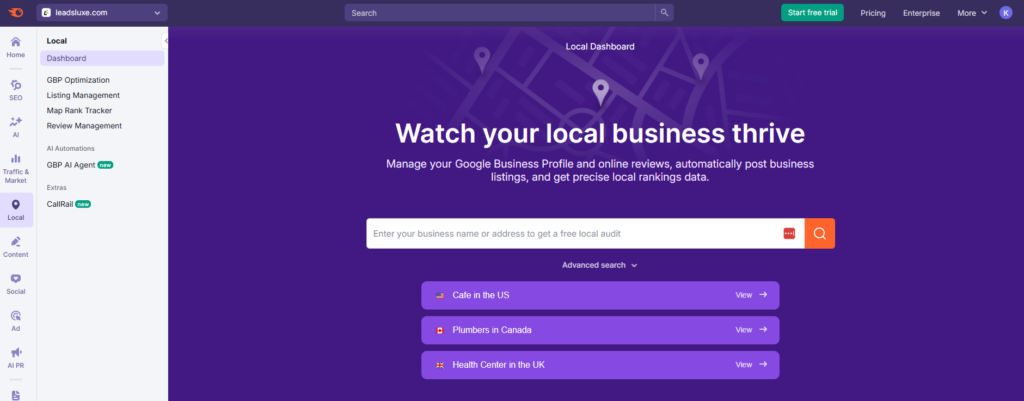
Semrush is known for enterprise SEO, but their local toolkit is criminally underrated.
If you’re already using Semrush for general SEO or you want the best tools for local keyword research combined with listing management, this deserves serious consideration.
What it does: Semrush Local offers listing management across 150+ directories (including Google, Facebook, Yelp, TripAdvisor), Google Business Profile optimization with AI-powered insights, review management with competitor analysis, and map rank tracking with heatmap visualization. The integration with Semrush’s main platform means you get local keyword research tools, competitor analysis, and content optimization all in one place.
Why it wins: The keyword research capability is unmatched. You can identify exactly what terms your local customers are searching, see search volume, and discover gaps your competitors are missing. Then you can optimize your GBP and website content based on actual data instead of guessing.
Pricing: Semrush Local starts at $20 per location per month. Full Semrush access (which includes the local toolkit) starts at $139.95/month.
Best for: Businesses that want deep keyword insights, agencies serving multiple clients, and companies running comprehensive digital marketing campaigns beyond just local SEO.
Time investment: Initial audit and setup takes 3-5 hours. Ongoing management takes 1-2 hours monthly.
4. Local Falcon: Precision Rank Tracking (Paid)
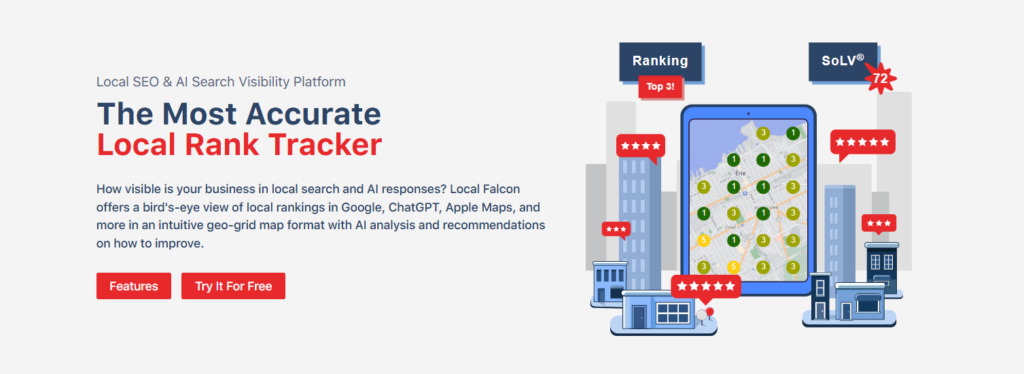
Local Falcon does one thing exceptionally well: it shows you exactly where you rank on Google Maps across your entire service area with surgical precision.
While other tools give you average rankings from a single point, Local Falcon creates a geo-grid showing your visibility from multiple locations.
What it does: Local Falcon uses geo-grid technology to scan your rankings from dozens or hundreds of points around your service area. It displays results as a color-coded map, making it instantly clear where you’re dominating and where you’re invisible. It also tracks competitors on the same grid, shows your Share of Local Voice (how often you appear in the local pack), and provides AI-powered recommendations for improvement.
Here’s the problem…
Your ranking isn’t uniform across your service area.
You might rank #1 in the north part of town but not show up at all five miles south. Local Falcon reveals these blind spots so you can focus optimization efforts where they’ll have maximum impact. Traditional rank trackers miss this entirely.
A roofing contractor thought he was ranking well city-wide based on basic rank tracking. Local Falcon revealed he was only visible in a three-mile radius around his office.
The southern suburbs, which represented 40% of his target market, couldn’t find him at all.
He created location-specific landing pages and built citations for those areas.
Six months later, his geo-grid showed visibility across 85% of his service area and his lead volume doubled.
Pricing: Pay-as-you-go credit system or monthly plans starting around $25. Extremely affordable for the insights you get.
Best for: Service-area businesses (plumbers, electricians, landscapers), businesses with large geographic territories, and agencies that need to prove ROI to clients with visual data.
Time investment: Initial scan takes 15 minutes. Monthly scans take 10 minutes each.
5. Whitespark: Citation Building Specialist (Paid)
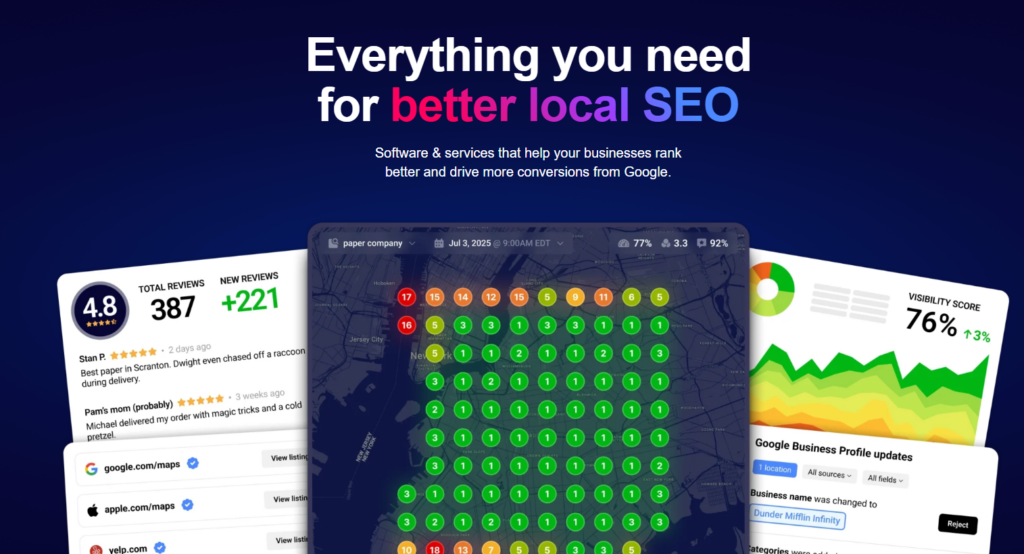
Whitespark specializes in local citations and reputation building.
If you need to establish your business presence across hundreds of directories or automate your review collection process, Whitespark delivers precision tools without unnecessary bloat.
What it does: Whitespark offers three core tools: the Local Citation Finder (discovers citation opportunities specific to your industry and location), the Reputation Builder (automates review requests via email and SMS across 100+ platforms), and the Local Rank Tracker (monitors your Google Maps and organic rankings by location and keyword). Unlike all-in-one platforms, you can purchase just the tools you need.
And guess what?
Not all citations are equal.
A citation on a general directory is nice. A citation on an industry-specific site carries more weight.
Whitespark’s Citation Finder identifies high-value opportunities your competitors are missing, giving you an edge in competitive markets.
Let me give you an example…
A boutique hotel was getting crushed by chain hotels in local search.
They used Whitesark’s Citation Finder to identify 78 travel and hospitality-specific directories where they weren’t listed.
After building those citations over 90 days and launching automated review requests through the Reputation Builder, they jumped from page two to the local pack and saw a 52% increase in direct booking inquiries.
Pricing: Reputation Builder starts at $20/month. Local Rank Tracker and Citation Finder are separate purchases. You can also hire Whitespark to build citations for you (starting around $497/month).
Best for: Businesses entering new markets, companies with poor existing citation profiles, and anyone who wants specialized tools for specific local SEO tasks.
Time investment: Citation research takes 1-2 hours. Implementation depends on whether you DIY or hire it out. Reputation Builder requires 30 minutes of setup then runs automatically.
6. Moz Local: Simplified Listing Management (Paid)
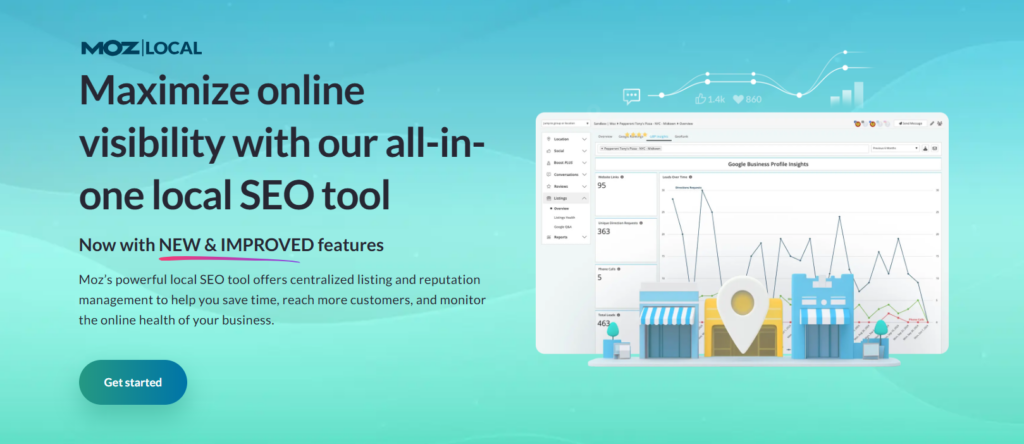
Moz Local focuses on making citation management painless.
It’s not the cheapest option, but it’s one of the most reliable for ensuring your business information stays consistent across major data aggregators and directories.
What it does: Moz Local distributes your business information to major data aggregators (which feed hundreds of smaller directories), monitors listings for accuracy, flags duplicate listings, provides review management, and generates reports showing your listing performance. The interface is cleaner and less overwhelming than some competitors.
Data aggregators like Neustar Localeze, Data Axle, and Foursquare power thousands of directories, apps, and GPS systems.
Getting listed with them multiplies your reach exponentially. Moz Local handles these relationships automatically.
I found this dental practice that was spending hours manually updating listings whenever they changed phone systems or expanded services.
Moz Local automated the entire process.
When they added Saturday hours and a new hygienist, one update in Moz pushed changes to 40+ directories within days.
They also discovered three duplicate listings showing their old address, which Moz helped remove. Appointment calls from online search increased 28% in the following quarter.
Pricing: Lite plan at $129/year (no review management or social posting). Preferred plan at $299/year (includes everything). Pricing is per location.
Best for: Small to mid-sized businesses with 1-5 locations, businesses that want set-it-and-forget-it listing management, and companies without dedicated marketing staff.
Time investment: Initial setup takes 1 hour. Minimal maintenance required thereafter.
7. Yext: Enterprise Multi-Location Solution (Paid)
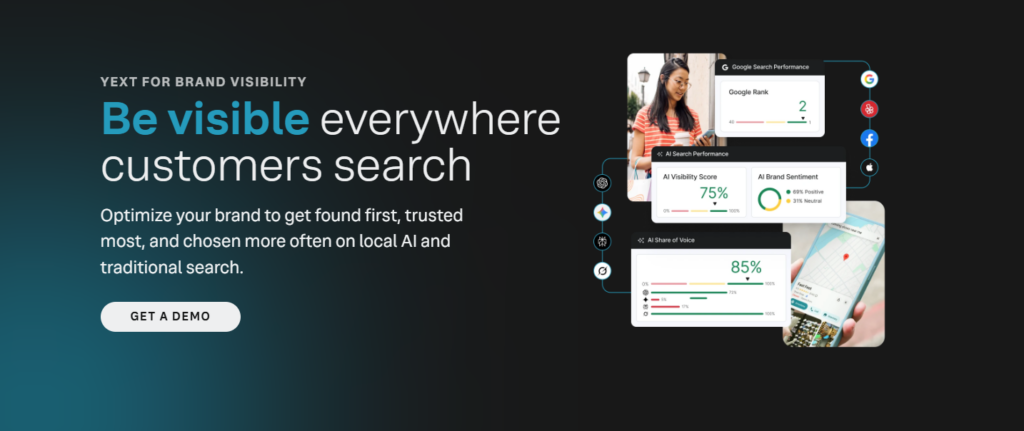
Yext is built for businesses with dozens or hundreds of locations.
If you’re managing a franchise, retail chain, or multi-location service business, Yext provides the infrastructure to maintain consistency at scale.
What it does: Yext syncs your business data across 200+ services including search engines, maps, apps, social networks, and voice assistants. It includes real-time updates (change your hours once, it updates everywhere instantly), listings analytics, review monitoring, and integration capabilities with existing marketing technology stacks.
Trust me, managing 50 locations manually is impossible.
Thankfully, Yext makes it manageable.
You get centralized control, bulk editing, role-based access for regional managers, and enterprise-level security.
I was told that a quick-service restaurant chain with 120 locations was dealing with constant listing errors.
Franchise owners were updating information randomly, creating inconsistencies. Google showed wrong hours for 30% of locations.
After implementing Yext, they established corporate control over all listings while giving franchisees limited editing capabilities.
Listing accuracy hit 98%, calls to locations increased 22%, and customer complaints about incorrect information dropped by 81%.
Pricing: Starts around $500/year per location with volume discounts. Not cheap, but the alternative is hiring multiple people to manage listings manually.
Best for: Franchises, retail chains, restaurant groups, healthcare systems, and any business with 10+ locations that needs centralized control.
Time investment: Initial implementation takes 10-20 hours depending on location count. Ongoing management scales with business size.
8. GMB Everywhere: Quick GBP Optimization (Free)
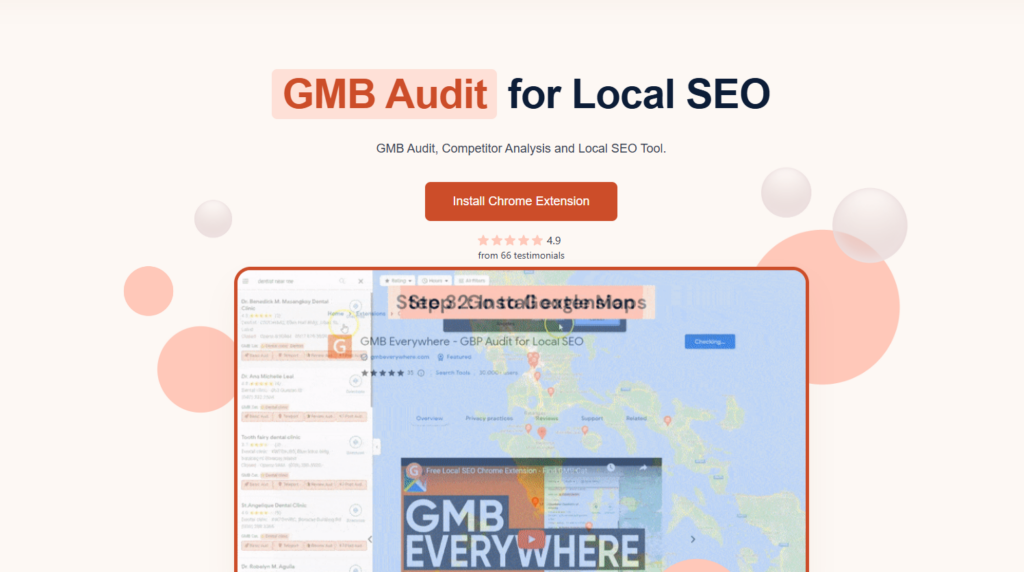
GMB Everywhere is a Chrome browser extension that supercharges your Google Business Profile workflow. It’s not a comprehensive platform, but it’s incredibly useful for quick optimizations and competitive research.
What it does: This extension adds extra functionality to your GBP dashboard. You can see character counts for descriptions (so you maximize space), access analytics faster, get optimization suggestions, and benchmark your profile against competitors. It also provides quick access to GBP tools without navigating through multiple screens.
By now you know this, time is money.
GMB Everywhere eliminates clicks and provides data you’d otherwise have to manually calculate. If you’re managing multiple GBP locations or need to move quickly, this streamlines your workflow significantly.
Imagine this, as a marketing consultant, managing 12 client GBP accounts was wasting 20-30 minutes per client navigating between screens and calculating metrics.
GMB Everywhere cut that time to under 10 minutes per client, giving her back 2-3 hours weekly to focus on strategy instead of admin work.
Pricing: Free.
Best for: Anyone actively managing Google Business Profiles, agencies with multiple clients, and businesses that need quick optimization checks.
Time investment: 5-minute installation. Saves time on every subsequent GBP session.
Your Burning Questions Answered
What is the best tool for local keyword research?
Semrush dominates local keyword research because it shows search volume, competition, and related terms specific to geographic areas. Ahrefs also offers strong local keyword data. Both are paid tools starting around $100+/month. If you need something cheaper, Google’s Keyword Planner (free with a Google Ads account) provides basic local keyword insights, though with less detail.
How much should I budget for local SEO tools?
Small businesses with one location can get started for $50-100/month combining Google Business Profile (free) with one paid tool like Local Falcon or BrightLocal. Multi-location businesses should budget $200-500/month depending on location count. Enterprise solutions like Yext run $500-2000+/month based on scale. Remember: one additional customer per month typically pays for these tools 5-10x over.
Can I do local SEO without paid tools?
Yes, but it’s slower and less competitive. Google Business Profile, Google Analytics, and Google Search Console are powerful free tools. You’ll spend significantly more time on manual work like citation building, rank checking, and review monitoring. Paid tools automate 80% of this work. The question isn’t “Can I do it free?” but rather “What’s my time worth?” If you can acquire one extra customer with the time saved, paid tools are profitable.
How long before I see results from local SEO tools?
Quick wins happen in 30-60 days: optimized GBP, claimed citations, consistent NAP information. Significant ranking improvements take 90-180 days as Google processes your improvements and builds trust. Competitive markets take longer. The businesses that dominate local search are the ones that consistently optimize for 6-12 months, not those looking for overnight magic. Want faster results with proven strategies? Our free local SEO audit identifies your biggest opportunities right now.
What’s the difference between local SEO tools and regular SEO tools?
Local SEO tools focus on geographic visibility: Google Business Profile optimization, citation management, local rank tracking, and review management. Regular SEO tools focus on organic search: keyword research, backlink analysis, technical site audits, and content optimization. Best results come from using both. Tools like Semrush and Ahrefs bridge both worlds, offering comprehensive SEO features plus local-specific capabilities.
Stop Researching, Start Ranking
Information without action is worthless.
You now know more about local SEO tools than 90% of your competition. That knowledge means nothing if your Google Business Profile still isn’t optimized, your citations are inconsistent, and you’re not tracking your local rankings.
Pick one tool from this list and implement it this week. Not next month, not when you “have more time.”
This week.
Start with Google Business Profile since it’s free and takes a few hours. Then add one paid tool based on your biggest weakness.
Need better visibility data? Get Local Falcon.
Need citation cleanup? Start with BrightLocal or Whitespark.
Want comprehensive automation? Go with Semrush Local.
The businesses crushing it in local search aren’t using different information than you just read.
They’re simply executing while others procrastinate. They’re building citations while competitors debate. They’re collecting reviews while others ignore them. They’re tracking rankings while others guess.
Your competitors are searching for local SEO tools right now.
Some will read this article and do nothing.
Others will implement one tool and see results.
The question is: which group are you in?
If you’d rather skip the learning curve entirely and have experts deliver results, our local SEO services handle everything from citation building to GBP optimization to content strategy.
We’ve helped hundreds of local businesses go from invisible to dominant in their markets.
The difference between businesses that succeed and those that struggle isn’t knowledge, it’s execution.
Start executing today.
Read also: